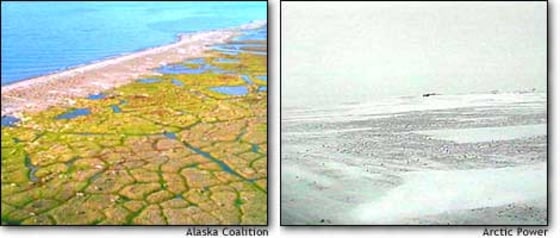Oil drilling on Alaska’s North Slope has disturbed some endangered species and made whaling harder, but it has not caused significant oil spills or a large decline in caribou, a scientific panel said Tuesday in a report requested by Congress.
The National Academy of Sciences panel said that development of the area since 1968 has produced large social and economic effects — some positive, such as better schools and health care, and some negative, like increased diabetes and alcoholism.
It said the environmental effects continue to grow despite efforts by the oil industry and regulators to minimize them, including new technologies that have reduced off-road travel and made drilling platforms smaller.
The report, an 18-month effort costing $1.5 million, offers the most comprehensive look so far at the cumulative environmental effects of oil drilling in Alaska. Oil from the North Slope, primarily around Prudhoe Bay, still accounts for 15 percent of the nation’s total production despite reduced output in recent years.
The report is expected to provide ammunition to all sides in an ongoing debate over whether to expand drilling into areas where it is now banned, including the adjacent Arctic National Wildlife Refuge.
RISKS, BENEFITS
“Continued expansion is certain to exacerbate some existing effects and to generate new ones - possibly calling for regulatory revisions,” the report says.
“Whether the benefits derived from the oil and gas activities justify acceptance of the inevitable accumulated undesirable effects that have accompanied and will accompany them is an issue for society as a whole to debate and judge.”
The Bush administration welcomed the report. Christie Whitman, administrator of the Environmental Protection Agency, said it confirms drilling can be done safely. “It is important to note,” Interior Secretary Gale Norton echoed, “that cutting-edge technologies would significantly reduce or eliminate a number of the effects cited by the academy.”
The report says abandoned equipment and buildings are likely to mar the landscape for centuries because state, federal and local overseers haven’t decided how the landscape should be restored.
CHANGE IN ANIMAL LIVES
Bowhead whales have changed their migration patterns to avoid offshore seismic exploration and some polar bear dens have been disturbed. Caribou herds shifted their calving areas to find vegetation and avoid insects.
Predators such as arctic foxes, ravens and gulls have thrived, feeding on garbage around the oil fields, but they also prey on rarer and in some cases endangered birds, the report said.
Stan Senner, executive director of Audubon Alaska and a peer reviewer of the academy’s findings, said the report debunks some of industry’s claims that oil and gas drilling have not affected the environment.
“There’s now a scientific rationale for protection of some of these key areas on Alaska’s North Slope,” he said.
However, Ed Porter, an economist with the American Petroleum Institute, said the report shows industry has steadily reduced harmful effects on the environment.
“There are some impacts that can’t be eliminated but there continues to be tremendous progress,” he said.
Sen. Ted Stevens, R-Alaska, questioned the report’s impartiality and said he was dismayed it was being used “as a weapon” to attack President Bush’s top energy proposal, opening a small coastal area of the wildlife refuge to drilling.
